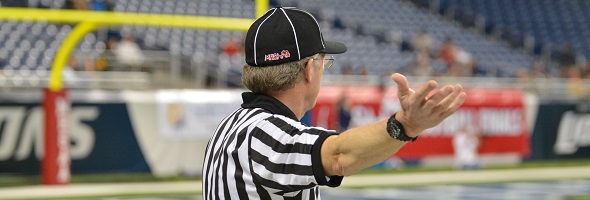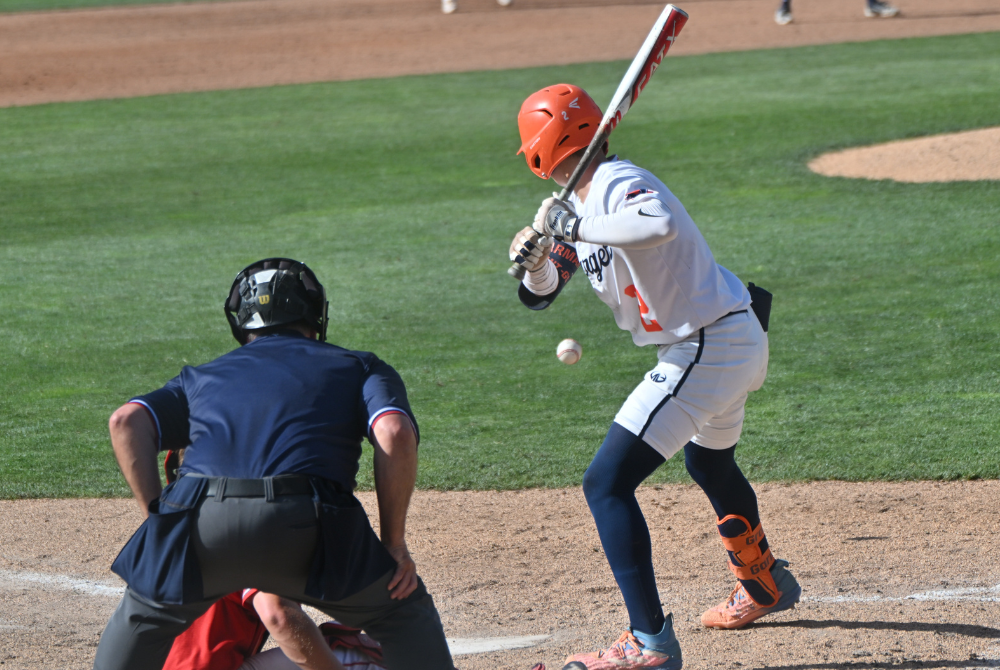
Be the Referee: Uncatchable Pass
October 30, 2014
This week, MHSAA assistant director Mark Uyl explains the differences between high school and college and pro rules when it comes to an uncatachable pass.
"Be the Referee" is designed to help educate people on the rules of different sports, to help them better understand the art of officiating and to recruit officials. The segment can be heard on Mondays, Wednesdays and Fridays during the school year on The Drive With Jack Ebling on WVFN-AM, East Lansing.
Below is this week's segment - Uncatchable Pass - Listen
Today we’re going to talk about one of the most misunderstood rules at the high school level, and that deals with the uncatchable pass.
All of us have sat in front of our televisions on Saturday or Sunday and seen the long pass get thrown, followed immediately by the throwing of the flag. As the officials discuss what happened, the referee invariably clicks on the microphone and announces that there is no foul for pass interference because the pass was uncatchable.
At the high school level, that is not a factor in deciding whether or not pass interference has occurred. The ball does not have to be catchable, and if the contact is ruled as pass interference, that foul stands, regardless of the quality of the pass.
Past editions
Oct. 22 - Preparation for Officials - Listen
Oct. 15 - Automatic First Downs - Listen
Oct. 8 - Officials & Injuries - Listen
Oct. 1 - Overtime - Listen
Sept. 25 - Field Goals - Listen
Sept. 18 - Tackle Box - Listen
Sept. 11 - Pass Interference - Listen
Aug. 25 - Targeting - Listen

Be the Referee: Pine Tar Usage
By
Paige Winne
MHSAA Marketing & Social Media Coordinator
March 26, 2025
Be The Referee is a series of short messages designed to help educate people on the rules of different sports, to help them better understand the art of officiating, and to recruit officials.
Below is this week's segment – Pine Tar Usage - Listen
Those of a certain age remember the Pine Tar Incident involving George Brett – when the Hall of Famer was called out after homering in the ninth inning for having too much pine tar on his bat. Kansas City appealed that decision. Major League Baseball agreed and Brett’s homer was re-instated, leading to a Royals win.
Is pine tar allowed at the high school level? It is. Pine tar, resin, or any drying agent can be applied to any bat – up to 18 inches from the base of the knob.
If a bat has too much pine tar, what happens to the offender?
If it’s caught before the at-bat, the bat is simply removed from play.
If the at-bat has started, then the bat is removed from play AND the batter is called out.
Previous 2024-25 Editions
March 11: Basketball Replay - Listen
March 4: Gymnastics Deduction - Listen
Feb. 25: Competitive Cheer Inversion - Listen
Feb. 18: Ice Hockey Delay of Game - Listen
Feb. 11: Ski Helmets - Listen
Feb. 4: Wrestling In Bounds or Out? - Listen
Jan. 21: Block or Charge? - Listen
Jan. 14: Out of Bounds, In Play - Listen
Jan. 7: Wrestling Scoring - Listen
Dec. 17: Bowling Ball Rules - Listen
Dec. 10: Neck Laceration Protector - Listen
Dec. 3: Basketball Goaltending - Listen
Nov. 26: 11-Player Finals Replay - Listen
Nov. 19: 8-Player vs. 11-Player Football - Listen
Nov. 12: Back Row Setter - Listen
Nov. 5: Football OT - Listen
Oct. 29: Officials Registration - Listen
Oct. 22: Volleyball Serve - Listen
Oct. 15: "You Make the Call" - Soccer Offside - Listen
Oct. 8: Roughing the Passer - Listen
Oct. 1: Abnormal Course Condition - Listen
Sept. 25: Tennis Nets - Listen
Sept. 18: Libero - Listen
Sept. 10: Cross Country Uniforms - Listen
Sept. 3: Soccer Handling - Listen
Aug. 24: Football Holding - Listen

